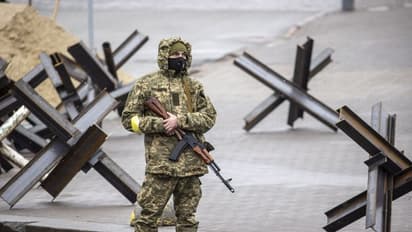India issues dos and don'ts for nationals stranded in Kharkiv

Synopsis
The defence ministry has issued a special advisory for Indians who are yet to exit from the war-zone in Ukraine's Kharkiv which expects them to be prepared for dangerous situations that may emerge in the days ahead.
The defence ministry has issued a special advisory for Indians who are yet to exit from the war zone in Ukraine's Kharkiv which expects them to be prepared for dangerous situations that may emerge in the days ahead.
The advisory lists a series of potentially dangerous scenarios that Indians in Kharkiv need to watch out for. These include missile strikes, artillery shelling, small arms and gunfire, grenade attacks, aerial raids, attacks by aircraft and drones and Molotov cocktails thrown by local people and the militia.
Other threats to Indians in Kharkiv include building collapses, Internet jamming, lack of electricity, food and water, exposure to freezing temperature, psychological trauma, lack of medical support, transportation and face-to-face situations with armed fighters.
The defence ministry has specified a list of Dos and Don't for the Indians stranded in Kharkiv. Let's take a look
* Gather and share info with fellow Indians
* Do not panic. Remain mentally strong
* For small groups comprising ten Indian students. Each team should have a coordinator and a deputy coordinator.
* The group coordinator must always know your whereabouts.
* Make a WhatsApp group. Share personal details and geolocation with Embassy control rooms in Embassy.
* Take a headcount every eight hours. Group coordinators should report their location to Control Rooms
* Only coordinators and deputy coordinators should interact with authorities -- local and embassy -- to conserve phone batteries.
* Save food and water. Eat smaller portions to extend the stock. Remain hydrated at all times.
* Every person must have a large garbage bag to be used ground matting or avoiding exposure to rain or cold in times of forced evacuation.
* If injured or ill, notify and seek advice from the control room via WhatsApp
* Conserve phone battery by deleting all unnecessary apps in mobile; limit conversations to low volume/audio mode.
* Remain indoors, ideally in designated safe zones, basements and shelters.
* Walk on the sides of the roads, close to the cover of buildings, crouch low to avoid being targeted. Turn around street corners in urban areas with great caution.
* Every 10-member group must have a white flag or cloth for waving.
* Learn some sentences in Russian like 'I am a student from India', I am a non-combatant', 'Please help me' and 'I am from India'
* When staying put at one place, maintain mild movement of limbs to keep the blood circulation going. Do regular deep breathing exercises.
* Take minimum personal belongings in a small backpack suitable for long trek/walking.
* Be ready to move under instructions at short notice
* If stopped by military check-post or by armed personnel, cooperate -- raise your hands with open palms facing forward above your shoulders. Provide necessary information. Contact the control room when possible without confrontation
* Evacuation movement should be done in coordination with authorities as advised by the control room.
What Indians stranded in Kharkiv must not do:
* Avoid stepping out of the bunker or shelter.
* Do not go to downtown/crowded areas
* Do not join the militia or local protestors
* Refrain from commenting on social media
* Do not pick up weapons or any unexploded ammunition/shells
* Do not take pictures/selfies with soldiers, military vehicles or check posts.
* Do not film the combat situations
* Do not light fires in enclosed spaces
* Avoid consuming alcohol or substances
* Do not wear wet socks to avoid chill blains/frostbite.
* Do not take shelter in unstable/damaged buildings
* At check-posts, do not suddenly reach for things/documents in your pockets and alarm the armed personnel unless they tell you to do so. Do not engage in sudden movements when armed personnel confront you.
The defence ministry has also urged the students to keep an emergency kit ready. The kit should contain:
* Passport
* ID Card
* Essential medication
* Life-saving drugs
* Torch
* Matchbox
* Lighter
* Candles
* Cash
* Energy bars
* Power bank,
* Water
* First-aid kit
* Headgear
* Warm clothing
* Comfortable pair of shoes
Stay updated with the Breaking News Today and Latest News from across India and around the world. Get real-time updates, in-depth analysis, and comprehensive coverage of India News, World News, Indian Defence News, Kerala News, and Karnataka News. From politics to current affairs, follow every major story as it unfolds. Get real-time updates from IMD on major cities weather forecasts, including Rain alerts, Cyclone warnings, and temperature trends. Download the Asianet News Official App from the Android Play Store and iPhone App Store for accurate and timely news updates anytime, anywhere.